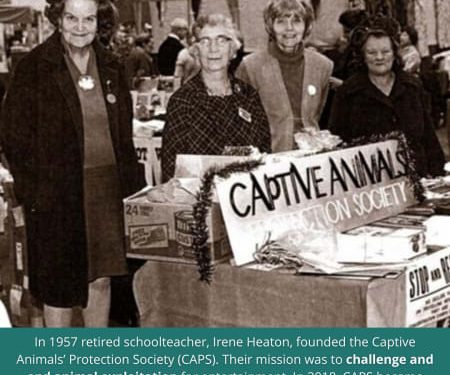At Freedom for Animals we have one very clear mission: End Captivity. We have been campaigning since 1957 for the closure of zoos and aquariums, and anywhere else where animals are forced into display and performance to satisfy human motives. That has never changed, and never will. So, how and why did our Campaigns Officer Isobel, and two members of the Vegan Activists Forum, end up having a relaxed and productive conversation with Edinburgh Zoo’s senior staff?
At Freedom for Animals it is vital that we shed light on the reality of the zoo and aquarium industry. We don’t just share our opinions on what life is like for animals in captivity, we share facts. For that reason, we send investigators into these places to obtain real, first-hand evidence. January 2025 involved one such investigation – behind the gates of Edinburgh Zoo.
Why Edinburgh Zoo?
As campaigners for the abolition of zoos, we know that every one of them is problematic. Local activists had expressed an interest in protesting Edinburgh Zoo’s existence, and reached out for our help. We had also heard a number of concerning reports from the zoo, such as the tragic deaths of two red pandas following fireworks displays in November 2024. We knew we needed a closer look. So we sent investigators into the zoo who documented what they saw, and what they found out from the staff they spoke to.
The January Investigation
In January, our investigators spent a full day in Edinburgh Zoo. Staff there were attending to repairs following recent storms that had been reported to have contributed to the death of a third red panda. As they made their way through the park, they were approached by multiple members of staff who were keen to chat informally about the animals and share their experiences, and they attended the formal keepers’ talks on numerous species. It was obvious that Edinburgh Zoo’s staff loved their jobs, and highly valued customer experience. But customer experience wasn’t our investigators’ concern, it was animal care, and what they found out in that regard was seriously worrying.
Investigators were told by staff that:
-
The zoo hosted an ‘Animal Antics’ show, in which animals were trained to perform for visitors.
-
The flamingoes were so uncomfortable in a small flock that they weren’t breeding.
-
Fireworks are a known cause of extreme stress for animals in the zoo, and were considered to have caused the deaths of two endangered red pandas in 2024.
-
Various species were kept in unnatural social groupings, including single sex groups and groups that were too small to provide for the animals’ social needs.
-
Wild animals with complex behaviours were routinely getting enrichment via Kong dog toys.
-
Close-contact visitor experiences were encouraged as an add-on to visits, apparently prioritising increased profits over animals’ rights to a peaceful existence.
These kinds of issues are not unique to Edinburgh Zoo, but ingrained within the zoo industry. It is important as animal rights campaigners that we challenge all of the problems with animal exploitation, not just the ‘worst offenders’. So, armed with the information provided to our investigators by Edinburgh Zoo staff themselves, Freedom for Animals worked with the Vegan Activist Forum to stage a demonstration outside the zoo for 2025’s Zoo Awareness Weekend.
Zoo Awareness Weekend 2025
Freedom for Animals is the organiser of Zoo Awareness Weekend. This is the UK’s largest annual co-ordinated grassroots action against animal captivity, and it takes place every Easter Bank Holiday weekend. In 2025, for the first time ever, we had a presence outside Edinburgh Zoo. Activists from Vegan Activist Forum greeted potential zoo visitors with a checklist to help them assess if zoos are really establishments they want to support. They also had iPads with a quiz loaded, to help to debunk common misconceptions about Edinburgh Zoo, and the wider zoo industry. The first ever Zoo Awareness Weekend demonstration at Edinburgh Zoo was looking like a great success! And then another ‘first ever’ happened: the zoo’s Chief Executive Officer, David Field, came out to speak to the activists! David said he supported their right to protest, and to spread information, but was concerned that some of it wasn’t factual. So, rather than ask them to leave, he invited the activists to contact his office, to make an appointment! This would be an incredible opportunity to discuss the issues raised by the investigation, and address some of the intrinsic problems in modern zoo practice.
The Edinburgh Zoo, Freedom for Animals, and Vegan Activist Forum Meeting
Freedom for Animals sent our Campaigns Officer, Isobel McNally, along to the meeting. So, in June 2025, Isobel found herself accompanying Shiva and Pamela from Vegan Activist forum, to meet three senior members of Edinburgh Zoo’s staff. This had the potential to be a very awkward meeting, with each side supporting very different approaches to satisfying our duties to protect and conserve wild animals. From our side, as zoo abolitionists, there were clearly things we would never agree on, so we focussed on those areas in which we could make progress.
What did we achieve?
We spent over two hours talking over the details of zoo management, from welfare audits to conservation goals, to community engagement. It was important to us that we seized the opportunity to influence the zoo’s behaviour going forward. One key message we wanted to leave them with, is that the exotic pet trade is continuing to spiral out of control, with wild animals as its innocent victims – and zoos are part of the problem. By presenting wild animals, like meerkats, servals, and reptiles, in a curated ‘collection’, visitors may easily leave with the impression that such animals are easy to keep in a controlled, domestic environment. This is a misconception that results in thousands of animals’ deaths annually. Edinburgh Zoo has agreed to review signage and messaging in the park and make changes where appropriate to deter visitors from seeking to ‘own’ exotic animals.
We also raised the issue of the vulnerability of the animals, particularly the red pandas, to environmental changes beyond the zoo’s control – factors such as the fireworks and storms that had reportedly resulted in the deaths of three red pandas within 3 months. Senior staff disputed the information given to our investigators by staff in January, and explained that there may have been more contributing factors. They have applied for an exclusion zone to be created around the zoo to prevent fireworks from being let off there, and are confident that it will be granted. Additionally, they pledged to continue to use their platforms to support a ban on the public sale of fireworks across the UK. Freedom for Animals will be monitoring that situation, and certainly would not want to see more endangered and sensitive animals, such as red pandas, introduced to the park at any point, but particularly before an effective exclusion zone around the zoo is active.
Where do we go from here?
At our meeting, David, Jo and Alan made us feel welcome, appreciated, and respected, whilst being determined in their convictions that, in David’s words, “zoos play a crucial role in protecting animals, connecting people with nature and delivering real conservation outcomes.” They explained a lot about their motivations to provide a community resource, in which they “witness daily how seeing and learning about animals up close can inspire a lifelong passion for protecting wildlife.” We don’t doubt that the zoo staff’s motivations are genuine, where we disagree is if it works, and even if it did, could it ever be worth it to keep wild animals in cages to achieve those aims? We don’t think so.
We look forward to seeing the results of research they told us they would be undertaking, to analyse the effect of visiting zoos on people’s behaviours towards the natural world. Zoos often claim that their visitors leave with a new appreciation for animals and habitats, but nobody has been able to prove that so far, and previous research has demonstrated that zoo visitors don’t modify their behaviour to benefit wildlife after they leave. As we approach 200 years since London Zoo opened as the first of its kind in the UK, more species are on the brink of extinction than ever – we would conclude that zoos are visibly not having positive effects on the natural world. Threatened species bred in zoos are almost never released to the wild, and zoos preserve those species not for the animals’ sake, but to maintain a ‘collection’. As species become extinct in the wild, their captive-held counterparts are not the future of the species – but a macabre living fossil record, trapped behind bars for eternity.
Hundreds of years since the first zoos were stocked with animals cruelly taken from the wild, today’s zoos remain populated by wild animals, with wild behaviours and instincts, craving a wild existence. Sadly, they can never have this, as zoos’ methods of breeding and keeping them in captivity deprive them of the skills they need to survive in the wild were they to be released. We do not turn our backs on those animals, and while we campaign for the end of zoos, we also need to see every improvement possible in the treatment of those doomed to spend their lives behind their bars. Edinburgh Zoo’s staff told us they share the goal of offering better lives to the animals held captive there. CEO David Field said:
As a modern zoo we strive to be open and transparent about our work, our decisions and the welfare of the animals in our care, which is why we were more than happy to welcome representatives from Freedom for Animals to visit us at Edinburgh Zoo and ask any questions they liked. Though we may differ in methods, our two organisations share many of our core values: compassion for animals, a desire to protect wildlife, and a commitment to doing better. We understand the importance of being challenged and believe that, with honest and respectful dialogue, working together where our values align, we can build greater public understanding and inspire a deeper commitment to animal welfare and nature conservation.
Since our meeting we have been invited to visit RZSS Highland Wildlife Park, and look forward to that meeting later this year. We also invite other zoos to follow Edinburgh’s example and invite us in to discuss our concerns.
So, who’s next? Perhaps Chester Zoo would like to see us, to explain the deaths of 19,111 critically endangered animals just last year? Or Blackpool Zoo may like to enlighten us on just what educational value there is to training a sea lion to balance a ball on their nose and clap, while hordes of children are encouraged to scream at the top of their voices? Or maybe one of the dozens of bird of prey ‘conservation centres’ or ‘sanctuaries’ across the country would like to tell us why they continue to keep birds tethered and caged, with no opportunity to satisfy their most central instinct – to fly free.
We’re ready for these conversations, Edinburgh Zoo was ready, but is the rest of the zoo industry brave enough?
Our game-changing meeting with Edinburgh Zoo started with an investigator. To help us send more investigators out into the field, support our crowdfunder today.









Discussion about this post